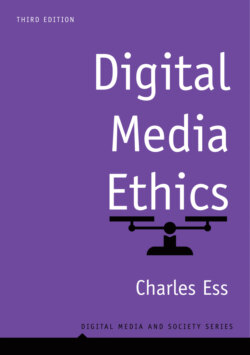Читать книгу Digital Media Ethics - Charles Ess - Страница 19
Digital media ethics: How to proceed?
ОглавлениеAt first glance, developing such an ethics would seem to be an impossible task. First of all, digital media often present us with strikingly new sorts of interactions with one another. So it is not always clear whether – and, if so, then how – ethical guidelines and approaches already in place (and comparatively well established) for traditional media would apply. But again, as emphasized in the term “post-digital,” digital media remain analogue media in essential ways – the music arriving at our ears remains analogue, etc. And so the lifeworlds of human experience that digital media now increasingly define remain connected with the analogue lifeworlds of earlier generations and cultures: this means that there remain important continuities with earlier ethical experience and reflection as well.
In addition, digital media as global media thus force us to confront culturally variable views – regarding not simply basic ethical norms and practices but, more fundamentally, how ethics is to be done. In particular, we will see that non-Western views – represented in this volume by Confucian, Buddhist, and African perspectives – challenge traditional Western notions of the primary importance of the individual, and thereby Western understandings of ethical responsibility as primarily individual responsibility. That is, while we in the West recognize that multiple factors can come into play in influencing an individual’s decision – e.g., to tell the truth in the face of strong pressures to lie, to violate another’s rights in some way, etc. – we generally hold individuals responsible for their actions, as the individual agent who both makes decisions and acts independently of others. But, these days, our interactions with one another predominantly take place via digital media and networks. This means, more specifically, that multiple actors and agents – not only multiple humans (including software designers as well as users) but also multiple computers, networks, bots, etc. – must work together to make specific acts (both beneficent and harmful) possible. Hence, in parallel with the distribution of information via networks, our ethical responsibility may be more accurately understood in terms of a distributed responsibility (Simon 2015). That is, ethical responsibility for our various actions via digital media and networks is “stretched” across the network. This understanding of distributed responsibility is, in fact, not an entirely new idea; rather, it is one shared with both pre-modern Western philosophies and religions and multiple philosophies and religions around the globe.
Certainly, this is a Very Good Thing: it suggests important ethical norms and practices that can be shared among the multiple cultures and peoples now brought into digital communication with one another. But it represents a major challenge, especially, to Western thinkers used to understanding ethical responsibility in primarily individualistic terms.
